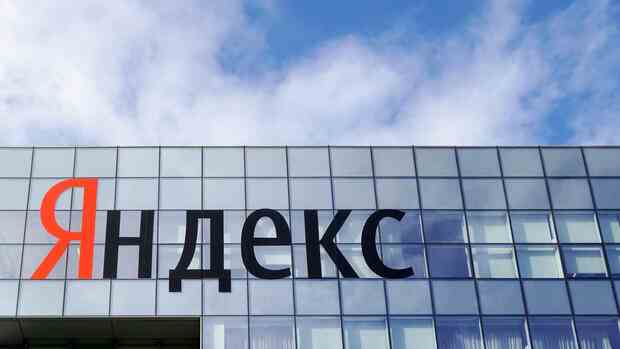Riga From today’s perspective, the scene seems almost unreal: It’s the summer of 2006, and Russian President Vladimir Putin is patiently answering questions from Internet users from all over the world. The occasion is a webcast. It is organized by the British broadcaster BBC – and the technology company Yandex. Even then, the group was Russia’s digital pride.
Now, 16 years later, the digital model company with international ambitions is threatened with splitting up as a result of Western sanctions against warmongering Russia – and falling into third-class status. In the future, future technologies are expected to remain with the Dutch holding company, which Yandex set up in 2007 for tax reasons. Businesses such as taxi and e-mail services will be spun off and will be managed by a new Russian company that will continue to use the Yandex name.
Last week It became known that Putin confidant and former finance minister Alexey Kudrin will move to the top of the Russian part of Yandex in order to manage the operational business. Most recently, Kudrin was head of the Russian Court of Accounts. The personnel is considered evidence that the restructuring of the group, the examination of which the Dutch parent company Yandex NV announced at the end of November, is likely to happen. Yandex NV justified the move with the “current geopolitical situation”.
Russia’s largest digital company shows what the war and Western countermeasures mean for Russia’s technology sector. Experts assume that the Russian part will use the state apparatus more than digitization in the future – and Russia will continue to fall behind digitally.
Top jobs of the day
Find the best jobs now and
be notified by email.
Putin confidante moves to the top
The reason for the split is, among other things, that the EU imposed sanctions on founder Arkady Wolosh in June. Brussels justified the move by saying Yandex was promoting “state media and narratives” in its search results and removing “content related to Russia’s war of aggression against Ukraine.” According to media reports, Volosh now lives in Israel, just like the last general director of the most important Russian subsidiary Yandex LLC, Elena Bunina. “I can’t work in a country that’s at war with its neighbors,” the 46-year-old is quoted as saying about her decision.
Since the beginning of the war against Ukraine, the Yandex search has mainly included news from pro-government media. Kevin Limonier from the French Institute for Geopolitics speaks of an “unprecedented control of the Russian-language information space through censorship” and the exploitation of discussion spaces by the voice of the authorities. According to critics, Yandex has made itself too dependent on the Kremlin. Observers fear that with the split and Kudrin’s entry into the Russian leadership of Yandex, the country’s Internet will now be subject to even more state control.
>> Read here: Iron Curtain of the 21st Century: How the Kremlin Dated Russia want to disconnect from the internet
The split is “the only way for the group to survive,” says Alena Epifanova, who researches Russia’s internet and technology policy at the German Council on Foreign Relations (DGAP).
The hope should also be that this will make the Yandex share tradable again. It has been suspended from trading on the Nasdaq since the end of February.
Kremlin chief Vladimir Putin is said to have approved the split. But Russia is left with nothing of the future technologies, says researcher Epifanova. “The part of the company that is supposed to remain in Russia is primarily responsible for service products, these are the areas that are of lower quality – for example maps or mail, taxis, food delivery services.” But for the Kremlin that is remaining business is still important – “solely because of all the data that the company can collect”.
“Russia will decline technologically”
Epifanova sees access to user data as one of the reasons for Putin’s approval. In addition, Putin is likely to be concerned with the country’s digital image: “Yandex has always been national pride when it comes to the digital economy,” says Epifanova. It is therefore important for the Russian leadership to show that parts of the company will remain in the country and that Yandex will keep its name in Russia.
Russia’s leadership has been talking about the path to more “digital sovereignty” for years. At the end of 2019, for example, a law came into force that, in extreme cases, allows the government to isolate the whole of Russia from the global network. Putin justified the move with national security. However, critics see this as a pretext to expand the surveillance of society. Epifanova, on the other hand, is convinced: “Russia will not gain digital sovereignty in the foreseeable future, but will decline technologically.”
Yandex was founded in the 1990s and was the first Cyrillic search engine to go online in 1997. In the years that followed, the group grew rapidly, expanded internationally, set up its own training centers in Russia and specific search services for countries such as Kazakhstan, Belarus, Uzbekistan and Turkey.
>> Read here: Putin takes part in meetings of the Eurasian Economic Union – but the signs are distant
Then came Russia’s war against Ukraine. In November 2021, the share was still listed on the Nasdaq at over 60 dollars. With the start of the Russian war of aggression against the neighboring country, the price plummeted to just under $19, then Nasdaq suspended trading until today. While the company was worth $31 billion at its peak in November 2021, its market cap is now just $6.8 billion.
The company’s global ambitions were dashed with the war, says DGAP expert Epifanova. The departing General Manager Elena Bunina understood that “in this situation” one cannot develop cloud computing or autonomous vehicles from Russia and instead concentrate on the Russian market.
More: Continuous Russian bombing – When will Putin run out of missiles?

